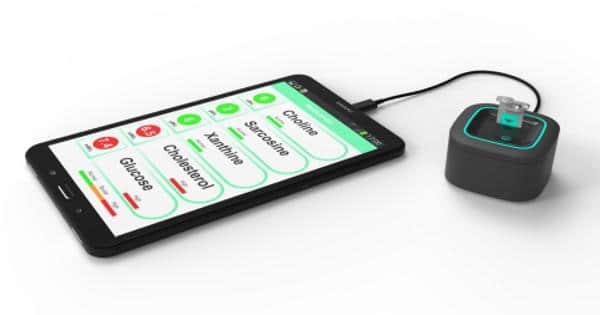Researchers created a hand-held device to measure crucial cancer biomarkers
Researchers invented a new hand-held device capable of measuring a crucial biomarker for cancer — opening the door for home-based cancer monitoring technology and improving access for diagnostic protocols. Researchers at McMaster and Brock universities have created the prototype for a hand-held device to measure a biomarker for cancer. The new device functions like monitors diabetic use to measure their blood-sugar levels — and can be used either at home or in medical clinics, without any lab work.
“A user would mix a droplet of blood in a vial of reactive liquid, then place the mixture onto a strip and insert it into a reader. In minutes, the device would measure an antigen that indicates the degree to which cancer is present.”
A user would mix a droplet of blood in a vial of reactive liquid, then place the mixture onto a strip and insert it into a reader. In minutes, the device would measure an antigen that indicates the degree to which cancer is present. The device could be used in a medical clinic or at home, all without lab work, greatly simplifying the process for testing blood for cancer’s signature.
The prototype has been designed to monitor prostate-specific antigen (PSA) and the technology can readily be adapted to measure other markers, depending on the form of cancer or other chronic diseases. A user would mix a droplet of blood in a vial of reactive liquid, then place the mixture onto a strip and insert it into a reader. In minutes, the device would measure an antigen that indicates the degree to which cancer is present.
The ability to collect such information at home would make the daily lives of patients much easier while also generating accurate, shareable, up-to-the-minute results to guide their doctors in shaping care and treatment — all at a lower cost to the health-care system. The prototype has been designed to monitor prostate-specific antigen (PSA) and the technology can readily be adapted to measure other markers, depending on the form of cancer or other chronic diseases, said the study appeared in the journal Angewandte Chemie.
The device would also allow patients to continue to monitor their health after treatment.
The prototype was created by a research collaboration led by McMaster’s Leyla Soleymani, a biomedical engineer and Canada Research Chair in Miniaturized Biomedical Devices, and Brock’s Feng Li, an associate professor of chemistry who leads a bioanalytical chemistry lab.
Soleymani’s team — which includes Richa Pandey and Sarah Traynor — created the hardware, consisting of the chip that reads blood samples. Li’s team (which includes Guan Wang) was responsible for the sample-analyzing technology.
“This is another step toward truly personalized medicine,” Soleymani says. “We’re getting away from centralized, lab-based equipment for this kind of testing. This would make monitoring much more accessible and cut down on the number of times patients need to leave home to provide blood samples.”
The researchers’ proof of concept work is described in an article published in the journal applied to Chemistry. The invention must be more fully tested before the regulatory approvals that would allow commercial manufacture are granted.
















